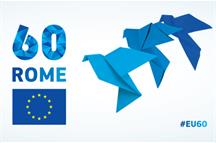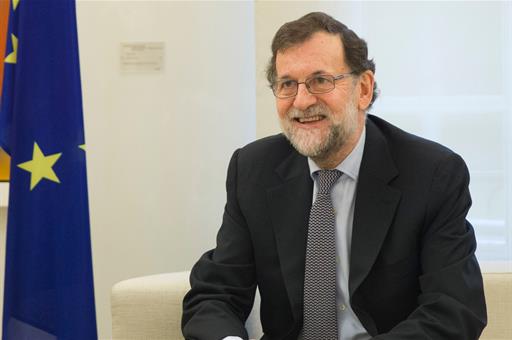Audience with His Holiness Pope Francis for the Heads of State and Government of the EU
On 24 March, Pope Francis is receiving the EU leaders in an audience. The visit has a special significance, as the 25th is the day the informal EU summit will be held to celebrate the 60th anniversary of the Treaties of Rome.
In the case of Spain, the visit was preceded by the visit to Moncloa Palace of the State Secretary of the Holy See, Pietro Parolin, on 14 October 2016. In addition, the President of the Government, Mariano Rajoy, was received in the Vatican by His Holiness Pope Francis on 15 April 2013.
Informal summit of Heads of State and Government of the EU on the 60th anniversary of the signing of the Treaties of Rome
On 25 March, the President of the Government will take part in Rome in the meeting of 27 Heads of State and Government of the European Union countries.
The summit will be held in the city to commemorate the 60th anniversary of the signing of the Treaties of Rome (the Treaty Establishing the European Economic Community and the Treaty Establishing the European Atomic Energy Community) on 25 March, 1957. The Treaties of Rome, together with the Treaty of the European Coal and Steel Community, signed on 18 April 1951 in Paris, constitute the foundational texts of the project for European construction.
The Rome Summit is expected to be attended by the 27 Heads of State and Government; the President of the European Parliament, Antonio Tajani; the President of the European Council, Donald Tusk; the President of the European Commission, Jean-Claude Juncker; and representatives of other institutions and organisations in the Union.
The Rome Summit will provide continuity to the process of reflection on the future of the European Union, which began with the Bratislava Summit, held on 16 September 2016. At the Rome Summit, the Heads of State and Government are expected to adopt a declaration that reviews what has been achieved in these 60 years of European construction and that lays down the main lines for the future of the integration process.
Political context
 The Rome Summit will be held in a context marked by the imminent notification by the United Kingdom of its intention to withdraw from the Union, the recent elections in the Netherlands and the upcoming elections in France and Germany.
The Rome Summit will be held in a context marked by the imminent notification by the United Kingdom of its intention to withdraw from the Union, the recent elections in the Netherlands and the upcoming elections in France and Germany.
On 20 March, the British government announced that the United Kingdom would present official notice on 29 March of its wish to withdraw from the Union, in accordance with Article 50 of the Treaty of European Union. This announcement was made after the British Parliament passed the Act allowing the Government to make this notification on 13 March.
At the press conference on 21 March, President Tusk announced that an extraordinary European Council meeting would be held on 29 April to adopt guidelines for negotiation on the agreement for withdrawal.
Rome Declaration
A declaration is expected to be signed in which Spain has actively participated. It will include most of the elements of the Spanish position relating to the debate on the future of the European Union.
The economic dimension
On the economic front, the European Union has become an economic power of the first order; it is the biggest trading power in the world; and above all it is a space with welfare levels that are incomparable anywhere else in the world, both in terms of the cover offered by their pension systems, and by their public health and education services.
As well as commemorating the past, the Heads of State and Government will also talk about the future in Rome. The Government of Spain is in favour of continuing with progress on the European project, aiming for more and better integration. This must be done, first, by acting decisively to respond to the issues that are of greatest concern to citizens at this time. These are the priorities identified in the Bratislava Summit held in September last year: economic and social development, internal and external security; and migration and external borders. Second, there must be a long-term vision of the European project that is capable of generating enthusiasm and trust. To do so, the Government of Spain considers that work must continue on greater economic and monetary union to ensure it operates efficiently and so that its benefits can reach down to all citizens.





